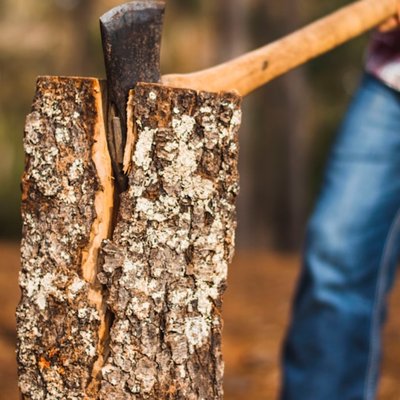crust(
kruhst
)A noun is a word referring to a person, animal, place, thing, feeling, or idea (e.g., man, dog, house).
a. la corteza (F)
(f) means that a noun is feminine. Spanish nouns have a gender, which is either feminine (like la mujer or la luna) or masculine (like el hombre or el sol).
This is delicious bread. The crust is crunchy, and the inside is nice and soft.Este pan es delicioso. La corteza está crujiente y el interior está blandito.
b. el mendrugo (M)
(m) means that a noun is masculine. Spanish nouns have a gender, which is either feminine (like la mujer or la luna) or masculine (like el hombre or el sol).
I soaked the crusts in olive oil and herbs, and then baked them to make croutons.Remojé los mendrugos en aceite de oliva, y luego los horneé para hacer crutones.
a. la tapa de masa (F)
(f) means that a noun is feminine. Spanish nouns have a gender, which is either feminine (like la mujer or la luna) or masculine (like el hombre or el sol).
Carmen uses a very thin crust on her pies.Carmen usa una tapa de masa muy delgada en sus tartas.
5. (geology)
a. la corteza (F)
(f) means that a noun is feminine. Spanish nouns have a gender, which is either feminine (like la mujer or la luna) or masculine (like el hombre or el sol).
The earth's crust floats on top of a sea of magma.La corteza terrestre flota sobre un mar de magma.
6. (medicine)
a. la costra (F)
(f) means that a noun is feminine. Spanish nouns have a gender, which is either feminine (like la mujer or la luna) or masculine (like el hombre or el sol).
A crust of dirt and blood formed over the cut on Sam's knee.Una costra de tierra y sangre se formó sobre la cortada en la rodilla de Sam.
A transitive verb is a verb that requires a direct object (e.g., I bought a book.).
7. (to encrust)
a. cubrir
See how these mosquito bites crust the body of the deer.Ve como estas picaduras de mosquito cubren el cuerpo del venado.
An intransitive verb is one that does not require a direct object (e.g., The man sneezed.).
a. formar una costra
The wound needs to crust over before it can heal.La herida debe formar una costra para poder cicatrizar.
a. endurecerse
We can't ski until the snow crusts.No podemos esquiar hasta que la nieve se endurezca.
Examples
Phrases
Machine Translators
Translate crust using machine translators
Conjugations
Other Dictionaries
Explore the meaning of crust in our family of products.
Random Word
Roll the dice and learn a new word now!
Want to Learn Spanish?
Spanish learning for everyone. For free.























